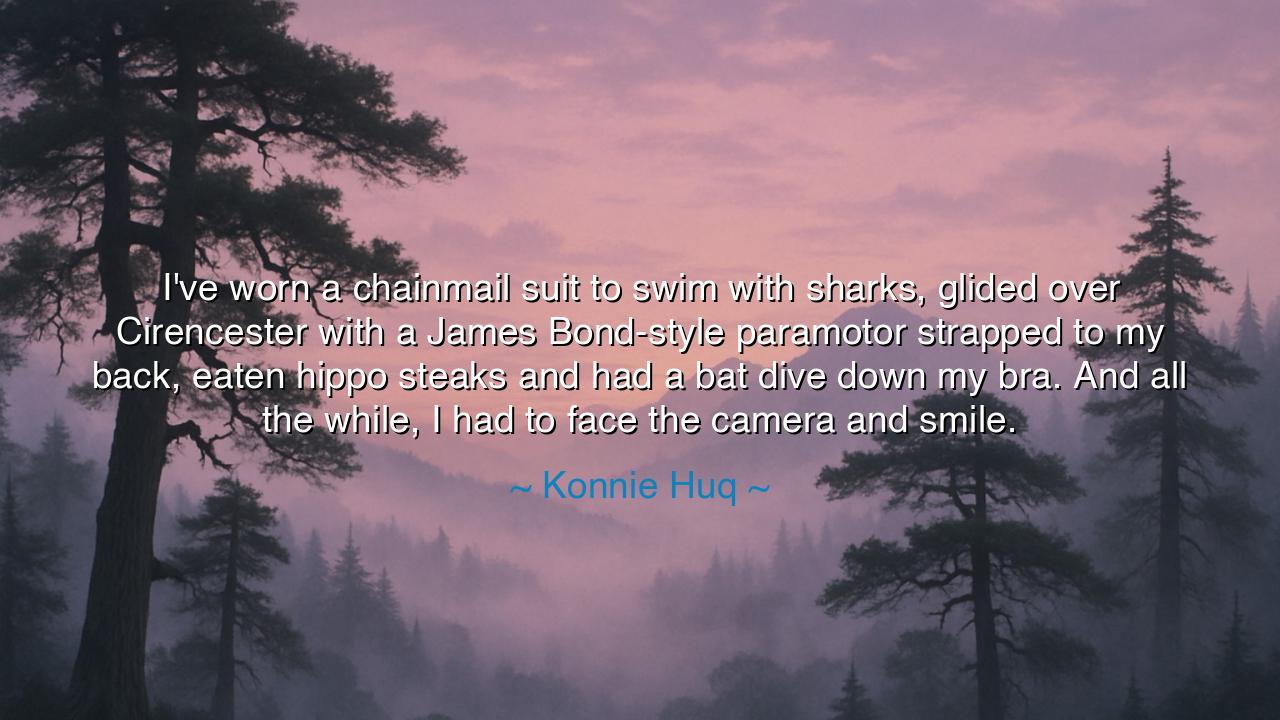
I've worn a chainmail suit to swim with sharks, glided over
I've worn a chainmail suit to swim with sharks, glided over Cirencester with a James Bond-style paramotor strapped to my back, eaten hippo steaks and had a bat dive down my bra. And all the while, I had to face the camera and smile.






Konnie Huq once recounted her extraordinary adventures with these vivid words: “I've worn a chainmail suit to swim with sharks, glided over Cirencester with a James Bond-style paramotor strapped to my back, eaten hippo steaks and had a bat dive down my bra. And all the while, I had to face the camera and smile.” At first, her tale may sound like nothing more than the wild escapades of a television presenter. Yet, when read with the eyes of wisdom, it becomes a parable about courage, composure, and the unyielding spirit of resilience in the face of chaos.
The ancients often admired those who could endure trials with serenity. For what is more noble: to fight in the arena against lions, or to stand calmly smiling while sharks circle your armored body? Huq’s chainmail suit becomes not just protection from teeth but a symbol of fortitude, of daring to step into danger while holding fast to grace. To glide through the skies like a hero of cinema is not merely spectacle—it is the embodiment of humanity’s ancient longing to fly, to transcend the ordinary, and to risk everything for the sake of wonder.
Her words remind us also of the duality of life: while extraordinary events unfold around us—sharks in the sea, bats in the air, and the unexpected trials of daily existence—we are still called to “face the camera and smile.” The camera here is more than a lens; it is the eye of the world, the constant gaze of society. To smile, even when unsettled, is to show mastery over fear. It is to proclaim: though life throws chaos at me, I remain unbroken, I remain present, I remain radiant.
History offers us echoes of this lesson. Consider the tale of Queen Elizabeth I, who, in the face of the Spanish Armada, stood before her troops wearing armor and spoke of having the body of a weak woman but the heart and stomach of a king. She, too, was facing sharks of another kind—armadas, cannons, and the weight of empire. Yet she smiled before her soldiers, hiding fear and showing courage. Her composure inspired a nation and turned the tide of history. Like Huq, she teaches us that even when the heart trembles, the face can shine with confidence, and that confidence changes the course of destiny.
There is also in Huq’s story the wisdom of adaptability. She did not plan to have a bat dive down her clothing, nor perhaps to eat exotic meats or glide through the air strapped to contraptions. Yet she embraced each moment as part of the adventure, never losing composure. Life itself is such a stage: we do not control all that happens, but we can choose to greet each surprise with a spirit of endurance and with the strength of a smile.
The deeper meaning of her words is this: the smile is not just a mask, but a weapon. It is how we conquer fear, how we reassure others, how we maintain dignity when all else seems absurd. To smile under pressure is to rise above it, to declare that even if the world is unpredictable, the spirit within remains steady. This is the mark of the true adventurer, the true leader, the true soul who inspires others not by what they endure, but by how they endure it.
So, my children, let this be your lesson: when the sharks of life circle, when unexpected trials dive upon you, when you are thrust into the skies without warning—face the camera and smile. Not because it is easy, but because in that moment, you show mastery over the storm. Train your heart to remain calm in chaos, and let your smile be the light that guides others through their own fears. For in the end, life will test you not only with battles, but with surprises—and your greatest triumph will be the serenity you bring to them.






AAdministratorAdministrator
Welcome, honored guests. Please leave a comment, we will respond soon